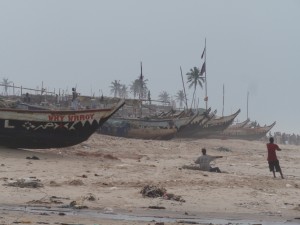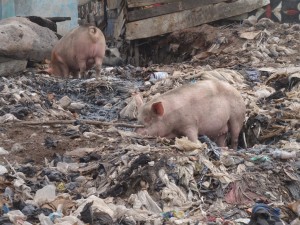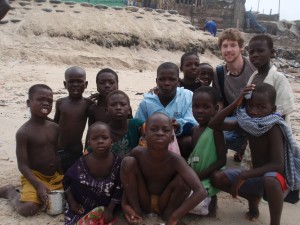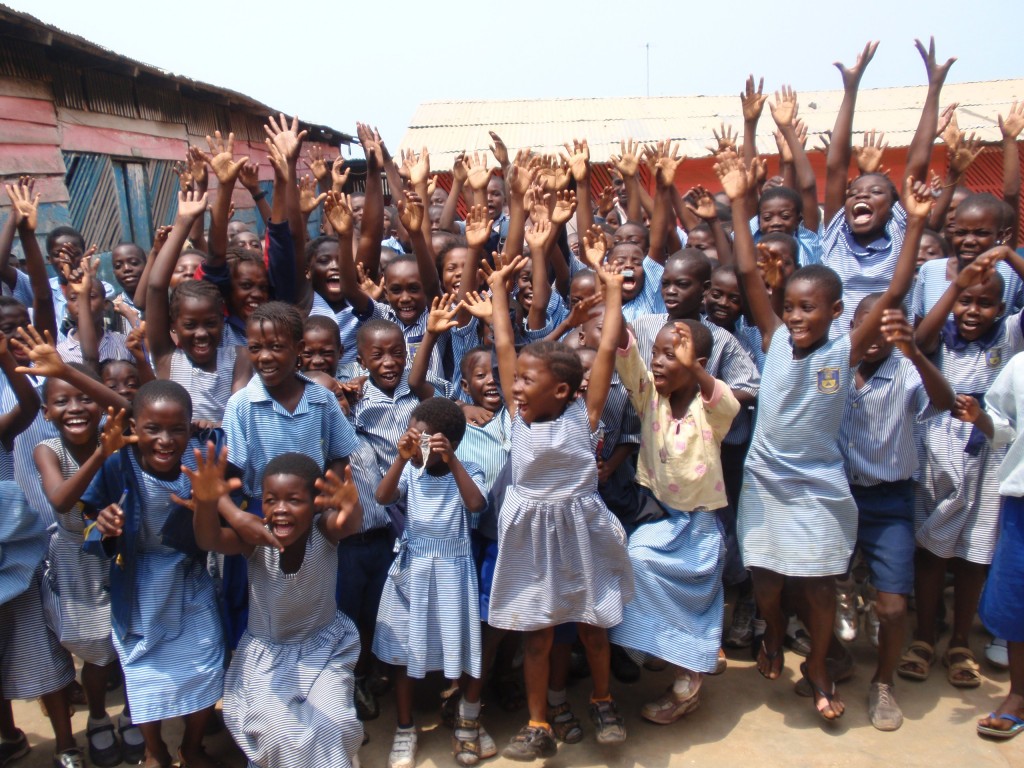 Accra, Ghana–Choco is a village just twenty minutes from Accra.   It appears small geographically, but the population is impossible to estimate. It could be 10,000 or it could be 50,000. It really doesn’t seem to matter how many people are there. The best way to understand it is to simply trudge down the beach.
Accra, Ghana–Choco is a village just twenty minutes from Accra.   It appears small geographically, but the population is impossible to estimate. It could be 10,000 or it could be 50,000. It really doesn’t seem to matter how many people are there. The best way to understand it is to simply trudge down the beach.
There, gorgeous sandy waterfronts and funky-looking fishing skiffs lie cheek in jowl with endemic poverty and filth. It is the sort of place where you’ll peer down the coast and see radiant sunshine, azure surf, grinning children splashing in the shallows and gregarious fisherman hauling in the day’s catch. But, as you walk closer, you realize that each wave that crashes brings with it an infusion of refuse; that the children are malnourished, skipping school and illiterate; that most of the day’s catch is nothing more than garbage and seaweed; that the fisherman are actually idle, sitting on their boats listlessly.
 There is no garbage pick up in Choco, at least not that I could see. The residents simply toss their refuse onto the beach in huge, stinking piles. A cadre of fat, repugnant pigs mill about, chortling amidst the squalid remains. Along the beach, patches of human feces dot the sand. I watched a man squat and defecate unabashedly just feet away from where a group of children congregated around a fishing net. I strolled over and they pointed excitedly at the silvery undulations of a sea snake trapped amidst a net full of junk and a few morbid-looking fish.
There is no garbage pick up in Choco, at least not that I could see. The residents simply toss their refuse onto the beach in huge, stinking piles. A cadre of fat, repugnant pigs mill about, chortling amidst the squalid remains. Along the beach, patches of human feces dot the sand. I watched a man squat and defecate unabashedly just feet away from where a group of children congregated around a fishing net. I strolled over and they pointed excitedly at the silvery undulations of a sea snake trapped amidst a net full of junk and a few morbid-looking fish.
Many I spoke with on the beach asked me for a handout, either a dollar or two or preferably some marijuana.  The community is rife with drug-dealing, human trafficking and prostitution and according to a teacher at a nearby school almost 80% of the town is illiterate. The local dialect is Ga and few residents speak decent English. At 11am on a Tuesday, packs of children were roving the beaches–clearly not in school. The teachers I talked to said that many only attended class when the fishing harvest was plentiful. When the fish were scarce, they were compelled to work all day hawking cheap goods to feed themselves.
A local social worker and I spoke with teachers at the schools. At the public school, there were big signs forbidding the students from speaking in dialect. The sole teacher we spoke to looked exhausted. She said the school served students from first to ninth grade and was without a single computer. “It’s difficult to keep them off the streets,†she said.
 The main gripe at the private school was funding. In fact, the majority of the students at the private school were the sons or daughters of the skiff owners–a privileged class amongst the neighborhood–but even they had difficulties paying the $100 a year tuition. I asked if there were any public health programs dealing with HIV or Malaria that the students were exposed to. The three teachers shook their heads. “Many of them [ the students] go fishing all night, then sleep outside on the ground. What’s a mosquito to them,†one said.
The main gripe at the private school was funding. In fact, the majority of the students at the private school were the sons or daughters of the skiff owners–a privileged class amongst the neighborhood–but even they had difficulties paying the $100 a year tuition. I asked if there were any public health programs dealing with HIV or Malaria that the students were exposed to. The three teachers shook their heads. “Many of them [ the students] go fishing all night, then sleep outside on the ground. What’s a mosquito to them,†one said.

Leave a Reply